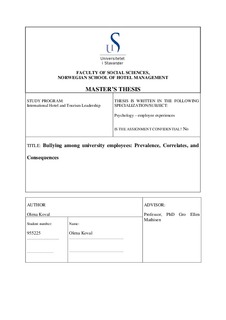| dc.description.abstract | The aim of the present study was to explore bullying and its effects among university employees (n = 211). It was hypothesized that bullying would have negative correlations with social support and work engagement, and that there would be a positive relationship between the experience of being bullied and psychological distress, absenteeism, turnover intention as well as transfers within the same organization.Workplace bullying was examined using Negative Acts Questionnaire (NAQ-R, Einarsen, Hoel & Notelaers, 2009), reliable and valid instrument for measurement of workplace bullying.
The results showed that 16.6% of respondents were classified as victims of bullying, applying bullying criteria based on behavioral approach, that is individuals experienced at least one negative act “at least once a week” during the past six months. This number was in line with previous research among university employees (Zabrodska & Kveton, 2012).
Confirming the previous studies, it was discovered that the most prevalent forms of bullying were related to work. Victims of bullying experienced more psychological distress, than non-victims. Findings showed that 5.5% of the variance in psychological distress was explained by bullying. There was a small, negative correlation between bullying and social support, with high levels of perceived bullying associated with low levels of social support.
Finally, the paper showed that bullying was significantly correlated with employees’ turnover intention. As for work engagement, absenteeism, and transfers within the same organization there was observed no significant relationship between the variables. Finally, the results did not provide support for the hypotheses that socio-demographic and work situation factors such as age, gender, and work experience affect the likelihood of becoming a victim. Hierarchical status, confirming the hypothesis, appeared not to be statistically significant in bullying experience. The findings from this study could be useful in developing work environment in university sector. | nb_NO |

